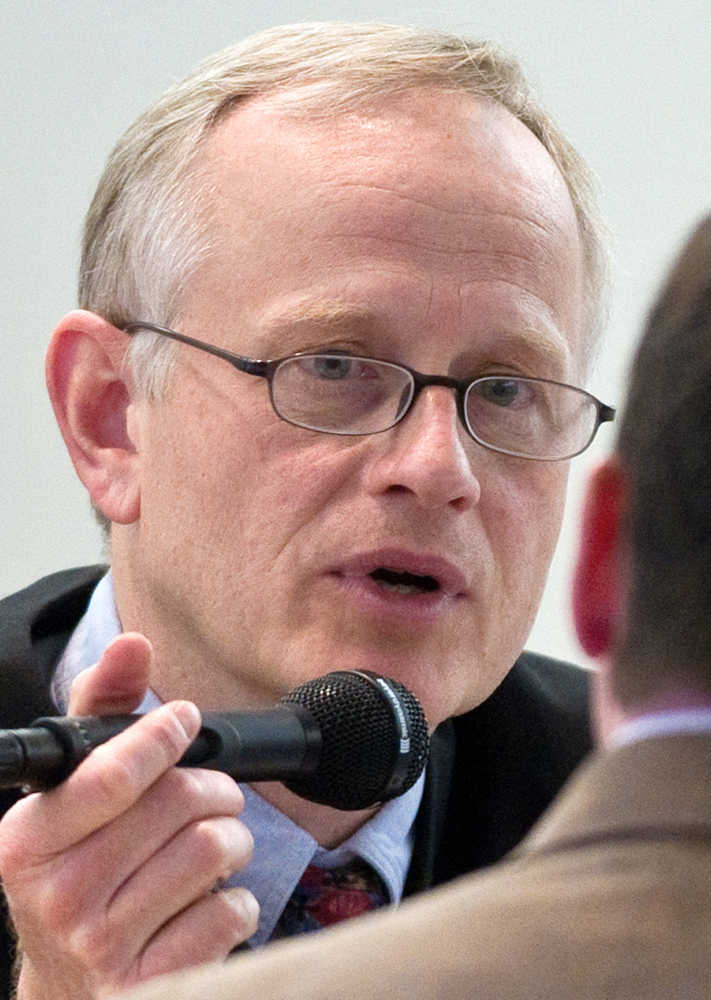The Alaska Judicial Council has recommended four finalists for the vacancy on the Alaska Supreme Court. The selection was announced Friday and leaves 45 days for Gov. Bill Walker to make the final decision on who will replace Dana Fabe, the justice who announced her retirement last year.
The four finalists, selected from among eight applicants, include two women and two men: Susan Carney, an Office of Public Advocacy attorney in Fairbanks; Jahna Lindemuth, an attorney in private practice in Anchorage; Andrew Guidi, an Anchorage Superior Court judge; and Philip Pallenberg, a Juneau Superior Court judge.
Ruth Botstein, Kevin Clarkson, Paul Roetman and David Voluck also applied for the vacancy but were not recommended to the governor by the Judicial Council.
“I appreciate the work done by members of the Alaska Judicial Council, and look forward to thoroughly reviewing each of the supreme court nominees they have put forward,” Walker said in a prepared statement.
While national headlines have been filled with the controversy surrounding the vacancy on the U.S. Supreme Court, the process of filling Alaska’s vacancy has been downright sedate by comparison.
“On the federal level, that’s a highly politicized process,” said Craig Stowers, chief justice of the Alaska Supreme Court. “In Alaska, happily, we have an entirely different process that was created through the brilliance and the foresight of the delegates to the Alaska Constitutional Convention. … The judicial selection process in our state is based on a merit selection.”
Under Article 4, Section 8 of the Alaska Constitution, a seven-member judicial council vets applicants for judgeships and forwards a list of finalists to the governor. Stowers, as chief justice, sits on the council but only votes if there is a tie among the other six members.
This time, all six voted unanimously in favor of the four finalists.
“I think when the council is unanimous like this, it lends a lot of legitimacy,” Stowers said.
The Alaska system might be calmer than the federal process, but that doesn’t mean it’s easy.
At the federal level, the president nominates a candidate and sends them to the Senate for confirmation. In Alaska, lawyers and judges apply for a vacancy. The judicial council sends a survey to every member of the Alaska Bar Association, asking for their opinions of each candidate.
“It’s a very difficult and trying process,” Stowers said of the survey.
Stowers went through the process himself, and he said that since the results are anonymous, bar members can “get a free shot” at people who aren’t capable.
“Sometimes, comments can be very painful to individual applicants,” he said. “It’s a hard process, and it takes time.”
The Judicial Council, whose membership is governed by the constitution to include members of the public and the bar association, interviews the candidates, analyzes the results of the survey, then holds a public meeting to make its decision.
That public meeting was held last week and resulted in the selection of Carney, Lindemuth, Guidi and Pallenberg.
“It’s a relief to get through a step in the process,” said Pallenberg, who also applied for an Alaska Supreme Court vacancy in 2012. In that case, Kodiak judge Joel Bolger was selected.
Pallenberg also went through that process when he was appointed to the Juneau Superior Court bench.
“I guess I’m an old hand at it by now,” he said.
At the Alaska Constitutional Convention in Fairbanks in 1956, delegates said they wanted the Judicial Council to pick “the tallest timber” and “the best timber” from the options available, not the person who fits an ideological or political mold.
Julie Willoughby is a Juneau attorney and sat on the Judicial Council until this year. She said that approach is still the council’s guiding principle.
“It’s apolitical, and it is a comparative merit-based process, and I absolutely believe that it functions as designed and that it’s a fantastically good system,” she said.
• Contact reporter James Brooks at james.k.brooks@juneauempire.com.

